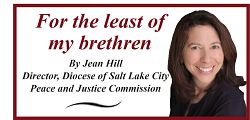Bishops' Letter Seeks to Remedy Racism
This year’s regular fall meeting of the Catholic bishops in the United States included two vital agenda items, only one of which received extensive press coverage. A basic Google search will bring up thousands of articles and commentaries about the bishops’ work on the sexual abuse crisis. What the press missed, however, was the bishops’ pastoral letter addressing the scourge of racism in our nation.
The abuse crisis conversation was of paramount importance, and will continue to be so until all cases are addressed and new instances of abuse are eliminated. But the bishops’ statement on racism addresses another aspect of our history that has ruined and continues to ruin the lives of thousands of men and women through policies, actions and attitudes that have persisted since the nation’s inception.
As the bishops remind us in the letter, from the moment the first Europeans encountered the Native Americans, their determination of superiority fostered a society of first- and second-class human beings. To this day, American Indians and African Americans remain subjected to unjust systems deemed acceptable through a prevailing belief that somehow it is all OK because “those” people are inferior to “us.”
The bishops are very clear about the impacts and importance of changing this belief:
“The injustice and harm racism causes are an attack on human life. The Church in the United States has spoken out consistently and forcefully against abortion, assisted suicide, euthanasia, the death penalty, and other forms of violence that threaten human life. It is not a secret that these attacks on human life have severely affected people of color, who are disproportionally affected by poverty, targeted for abortion, have less access to health care, have the greatest numbers on death row, and are most likely to feel pressure to end their lives when facing serious illness. As bishops, we unequivocally state that racism is a life issue. Accordingly, we will not cease to speak forcefully against and work toward ending racism. Racism directly places brother and sister against each other, violating the dignity inherent in each person.”
The bishops are also clear that it isn’t just the big acts of institutional racism that matter. While they seek to atone for their own acts of outward racism over the years, such as requiring that black parishioners receive Communion after their white brothers and sisters, the bishops also explain that even little acts are sinful. As they state, “Every racist act – every such comment, every joke, every disparaging look as a reaction to the color of skin, ethnicity, or place of origin – is a failure to acknowledge another person as a brother or sister, created in the image of God.”
The letter explains that “[r]acism is a moral problem that requires a moral remedy – a transformation of the human heart – that impels us to act.” It asks each of us to consciously, intentionally, combat racism within ourselves. First, by admitting that we acknowledge our own biases and prejudices, and then that we reform those biases by engaging with people who we may have feared, ignored or actively mistreated. As we begin to dialogue with our brothers and sisters of different races and ethnicities, the bishops also implore us to take concrete action. This includes challenging the extreme nationalist ideologies feeding our “public discourse with xenophobic rhetoric that instigates fear against foreigners, immigrants, and refugees” and advocating for equality in how laws are implemented and for moral budgets that reduce barriers to economic wellbeing, appropriate health care, education and training.
Combatting racism is not an easy task, as our history makes plain. “What is needed,” the bishops write, “and what we are calling for, is a genuine conversion of heart, a conversion that will compel change, and the reform of our institutions and society. Conversion is a long road to travel for the individual. Moving our nation to a full realization of the promise of liberty, equality, and justice for all is even more challenging. However, in Christ we can find the strength and the grace necessary to make that journey.”
Jean Hill is director of the Diocese of Salt Lake City Peace and Justice Commission.
© Copyright 2024 The Diocese of Salt Lake City. All rights reserved.


Stay Connected With Us